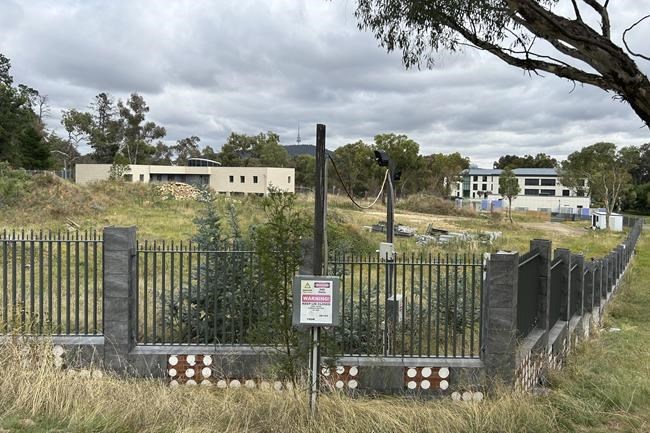CANBERRA, Australia (AP) — Australia's Parliament passed legislation on Thursday to prevent Russia from building a new embassy near Parliament House citing threats of espionage and political interference, as tensions grow between Moscow and a major supporter of the Ukraine war effort.
Prime Minister Anthony Albanese said the legislation would extinguish Russia’s lease on the site of a second embassy based on the advice of security agencies.
“The government has received very clear security advice as to the risk presented by a new Russian presence so close to Parliament House,” Albanese told reporters. “We are acting quickly to ensure the lease site does not become a formal diplomatic presence."
Albanese said Australia's government condemns Russia’s "illegal and immoral invasion of Ukraine.”
Australia is one of the most generous providers of military hardware, training and aid to Ukraine of any country outside NATO and has escalated sanctions against Russia since the war began in February 2022.
Australia's growing hostility toward Russia became apparent last year when Australian officials demanded Moscow be held accountable for Russian cybercriminals suspected of hacking the nation’s largest health insurer, Medibank, and dumping customers’ personal medical records on the dark web. It is unusual for Australia to attribute blame to a country for an unsolved cybercrime.
Albanese said opposition and other lawmakers that are not aligned with the government were briefed on the legislation on Wednesday night and had agreed to pass it through both chambers Thursday. The government holds a majority in the House but not the Senate.
Within three hours of Albanese publicly announcing the bill, it had become law, passing the House then the Senate. The law is expected to take effect later Thursday when it is rubber-stamped by Governor-General David Hurley, representing Australia's head of state, King Charles III.
Home Affairs Minister Clare O’Neil was later more specific about the Russian threat while addressing Parliament, saying the “scope for espionage and foreign interference from the site would have been a substantial risk for the nation.”
“The action is direct and decisive. We do not have any interest in sugarcoating this message,” O'Neil said. “We will not stand for espionage and foreign interference in our country. We will act in the face of danger to our democracy and our citizens and we will do so without any apology to anyone."
Opposition leader Peter Dutton said the Parliament was united against the Russian threat.
“We won’t tolerate foreign espionage conducted in a way that is against our national interest. We won’t tolerate people seeking to interfere with electoral processes in our country,” Dutton told Parliament.
Albanese did not directly answer when asked if there were also security concerns about the Chinese Embassy across a street from the Russian site.
“We’re dealing with this very specifically, and it’s based upon very specific advice as well about the nature of the construction that’s proposed for this site, about the location of this site, and about the capability that would present in terms of potential interference with activity that occurs in this Parliament House," Albanese said.
The Russian Embassy said it would comment later Thursday.
The Australian government decided to act after Russia won a Federal Court case last month that prevented its eviction from the site now under construction.
The 99-year lease was canceled by local Canberra authorities on the basis of a lack of construction activity since Russia was given the lease in the diplomatic precinct of Yarralumla in 2008 and plans for the complex of buildings were approved in 2011.
Under the lease conditions, Russia had agreed to complete construction within three years, but only a single, small perimeter building of the planned complex has been built.
Russia has said it already spent $5.5 million on the site.
The National Capital Authority, which administers embassy leases, decided to terminate the Russian lease, citing that “ongoing unfinished works detract from the overall aesthetic, importance and dignity of the area reserved for diplomatic missions."
Russia currently occupies the former USSR embassy in the suburb of Griffith, farther from Parliament House than the new site. The Yarralumla site would provide Russia with two clusters of buildings.
The Russian Embassy would remain in Griffith and Australia's Embassy would remain in Moscow, Albanese said.
O'Neil said no embassy would be allowed on the site.
“The principal problem with the proposed second Russian Embassy in Canberra is its location. This location sits directly adjacent to Parliament House,” O'Neil said.
___
Find more of AP's Asia-Pacific coverage at https://apnews.com/hub/asia-pacific
Rod Mcguirk, The Associated Press

